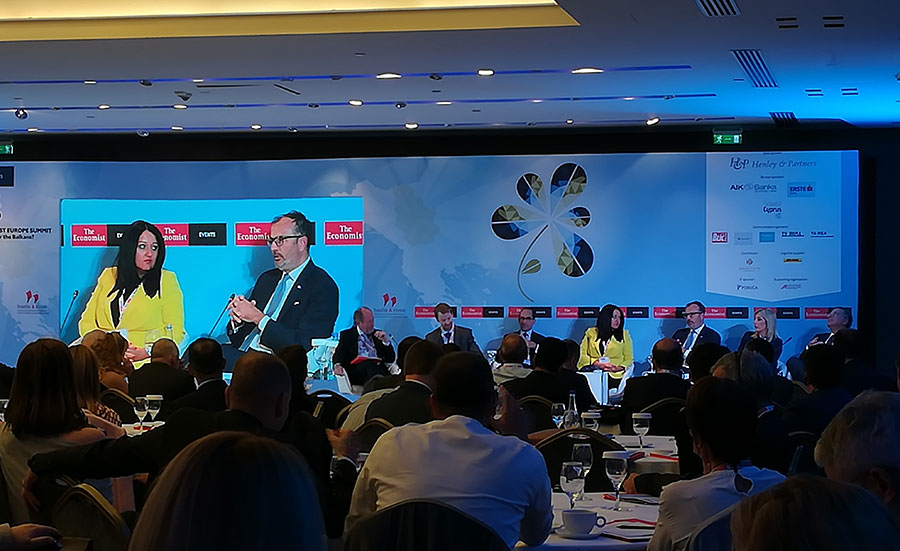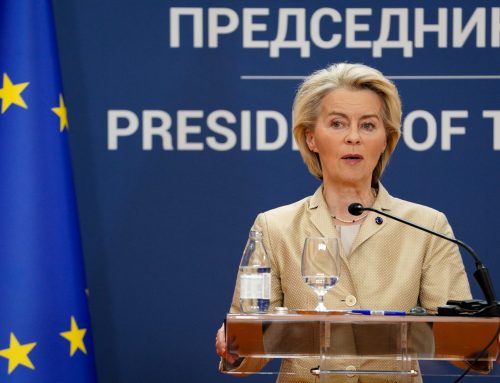Becoming an EU member as soon as possible is in the interest of Serbian citizens, Serbian Prime Minister Ana Brnabic said and added that the reform is being implemented for the sake of the economy and Serbian citizens, not the Union’s, reiterating that maintaining the regional stability is in Serbia’s interest.
Opening the 7th EU-Southeast Europe Summit ‘A sustainable recovery for the Balkans? – Serbia in a leading role,’ organised by the Economist, Brnabic said that EU accession was region’s top priority.
She said, however, that not all countries share “the Atlantic aspiration,” i.e. the intention to become NATO members.
“Serbia is not on the Euro-Atlantic path. We do not seek to become a NATO member. However, having in mind that we are a non-EU country we do have a high level of cooperation with the NATO through the Partnership for Peace,” said Brnabic.
She said that the main reason Serbia wanted to become an EU member is peace. When people ask me why Serbia wants to become part of the Union – at a moment when many doubt it or even try to leave it – my answer is because we think of the EU as a peace project, she said.
“Enlargement is back in EU’s focus and 2019 might be the year of excellent opportunities for countries in the region,” said Head of the EU Delegation to Serbia Sem Fabrizi, stressing that the EU supported Serbia as the frontrunner in the process of EU integration.
Sem Fabrizi said that enlargement was back in EU’s focus, adding that such a momentum should be seized.
“I believe we have a clear understanding about the future of the region – it’s in the EU. 2019 therefore might provide a major opportunity for the enlargement process,” Fabrizi said.
He said both Serbia and the region are making progress in the process of EU integration, reminding that Serbia has thus far opened 14 out of 35 chapters.
The macroeconomic situation of Serbia is improving, the economy is growing, the fiscal stability is in place, he said, adding, however, that further reform is needed in order to achieve sustainable growth.
“Also, the rule of law requires more effort, more “muscle,” as well as the constitutional reform and media freedom,” Fabrizi said.
Ambassador Fabrizi said there is progress when it comes to Belgrade-Pristina dialogue as well.
He described Serbia as highly active and said it invested great effort in reconnecting with other countries in the region.
“The region should interconnected by both hard and soft links. The more countries in the region integrate among themselves, the more they will be integrated within the EU. They will have corridors, the digital and energy agenda, etc.”
Fabrizi agreed with the Prime Minister when it comes to EU integration of Serbia and the reasons behind its accession process.
From various points of view – security, for example – EU accession of the Western Balkans is a geostrategic investment.
“The Sofia Declaration set out the roadmap. We now know where we are going, we are aware of the obstacles and of the must nots as well as of good opportunities. In his speech in September, Juncker said that we must find unity when it comes to the Western Balkans and bring it back into focus,” Fabrizi reminded.
He added that the path to accession implied greater prosperity, more justice and democracy, better markets… This will bring new energy and ideas into the EU, “a new geostrategic dimension in the southeast part of the European continent.”
All countries should work on the rule of law, democracy, good governance, economic reform, fight against organised crime and good neighbourly relations, he said.




